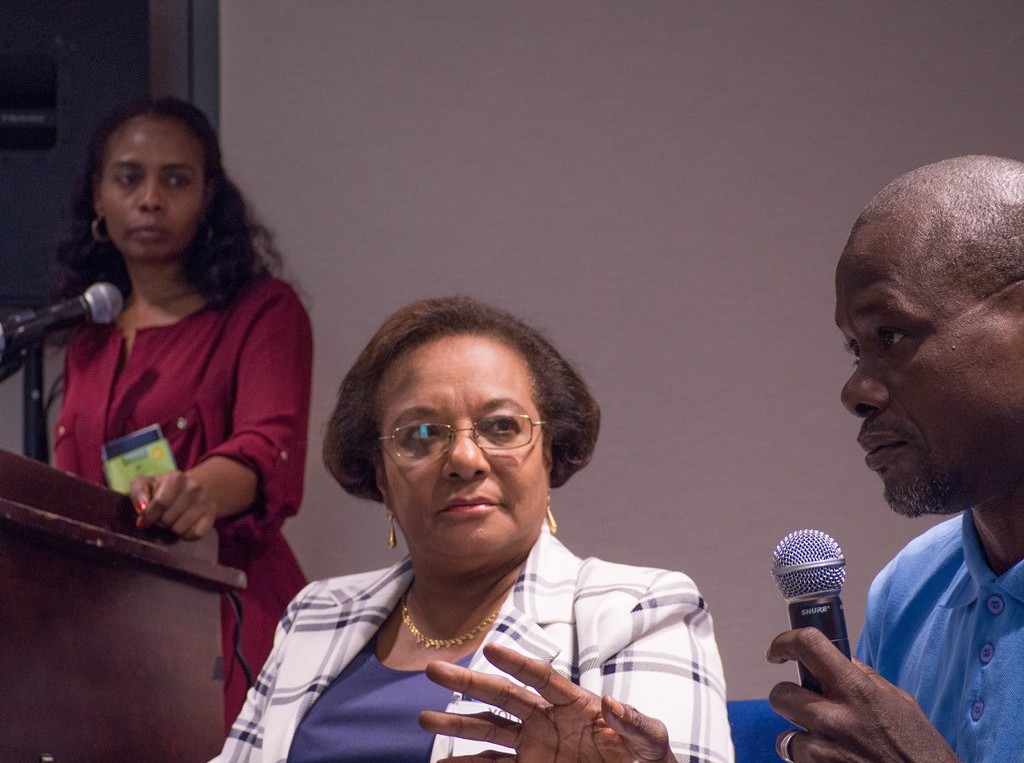Rethinking humanitarian aid: local leaders speak their minds
 Oxfam is dedicated to transforming the international humanitarian system into one where local leaders like Suréna and Jaquité sit in the driver’s seat whenever and wherever possible, and international agencies provide support as needed. Photo: Elizabeth Stevens / Oxfam America
Oxfam is dedicated to transforming the international humanitarian system into one where local leaders like Suréna and Jaquité sit in the driver’s seat whenever and wherever possible, and international agencies provide support as needed. Photo: Elizabeth Stevens / Oxfam America
From violence and hunger to earthquakes and epidemics, three panelists at the recent InterAction Forum haven’t just seen it all—they’ve been on the front lines of handling some of the worst disasters in recent history.
Elizabeth Stevens is a humanitarian communications officer for Oxfam
If they wanted to, Sahar Ali, Sidi Jaquité, and Yolѐne Suréna could hold audiences spellbound for hours with their stories. After all, they’ve been in the thick of the Darfur conflict, the Ebola crisis, and the Haiti earthquake of 2010. But as they took their places at an Oxfam-sponsored panel (“Turning the Humanitarian System on its Head; the Perspective of Local Actors”), they had a more pressing agenda: help international aid providers understand why and how to support local humanitarian leadership at times of emergency.
Suréna, who is the coordinator for Haiti’s Civil Protection Directorate, talked about how before and after the devastating earthquake in Haiti, many international actors added insult to injury by failing to support Haitian leadership. Haiti doesn’t need patronizing attitudes, she said, or duplication of efforts, or agendas driven by people who live far from the realities on the ground. “We don’t need people taking over—telling us what we have to do. What we do need is cooperation, dialogue, and respect for our capacity, knowledge, and culture.” In closing, she issued a warm welcome to international agencies, and a playful reminder to coordinate our work with the government: “The Civil Protection office is right near the airport. There is no way for you to miss it.”
She was joined by Sidi Jaquité, the director of the National Association for Local Development (NADEL), an organization that has taken a lead role in preventing cholera outbreaks in Guinea-Bissau, and in Ebola preparedness work. (There has been no Ebola in Guinea-Bissau, but the country shares a porous border with Guinea, where cases continue to emerge.) “Local actors at the community level add tremendous value,” he said. “They understand the real needs in the communities and speak the local languages. They understand traditional village values and know how to work with the local authorities. They are part of the fabric of the communities.” Local leadership, in other words, is crucial to halting deadly epidemics. In cash-strapped countries like Guinea-Bissau, international actors have critical support roles to play, as funders, advisers, and trainers who can share life-saving knowledge and skills. “We need international organizations, but they need us, too,” said Jaquité. “And if they want to work with us as partners, they have to help us become more self-sustaining.”

Panel moderator Sahar Ali, who coordinates Oxfam’s humanitarian work in Sudan, focused on what works—and doesn’t work—when armed conflict is at the heart of an emergency. “Early in the Darfur crisis, international organizations intervened in Sudan with huge staffs,” she said. “They had little understanding of the context and little communication with local people. We don’t want to see that happen again.”
Violence and displacement continue in Darfur, but now Oxfam works closely with local partner organizations and community leaders.
“We invest a lot in building the capacity of our partners—not just to help them carry out a particular kind of program but to help them become stronger organizations,” Ali explained. “We work with them on strategic planning, and on improving their systems for finance, logistics, and monitoring and evaluation.”
She pointed out that there are big advantages to working with local groups during conflict emergencies. They know the ins and outs of working with the government, and they can quickly gain access to displaced people in areas that may be off limits to international organizations. “People might think supporting local humanitarian leadership won’t be effective in places like Somalia and Sudan, but we are doing it and it is working.”
Armed conflict, poverty, injustice, and disasters have taken a terrible toll on the people of Haiti, Sudan, and Guinea-Bissau, but they haven’t destroyed the desire to protect and care for friends and neighbors and fellow citizens—the generous impulse that can make local humanitarian leadership so powerful.
And the struggles haven’t caused the panelists to lose their faith in the future. “There is hope that we will have a better life one day,” said Ali.